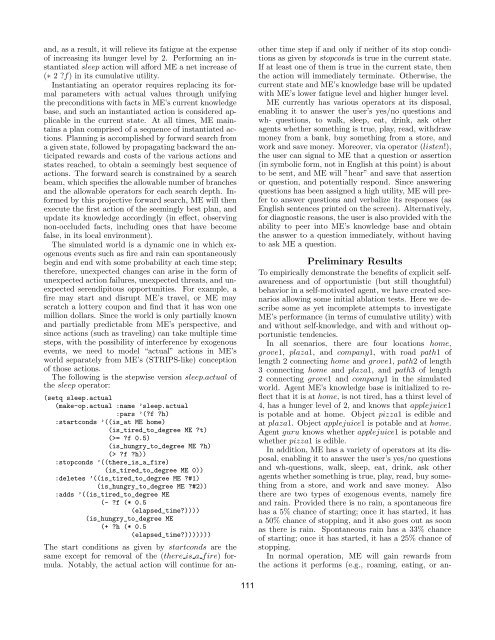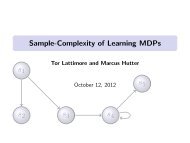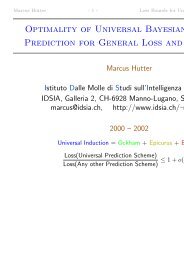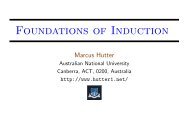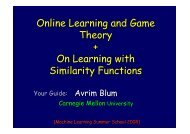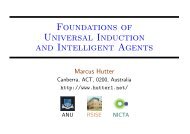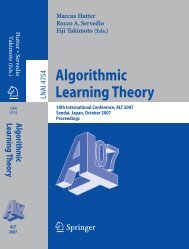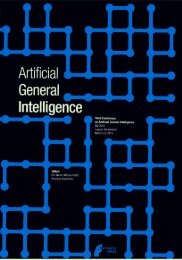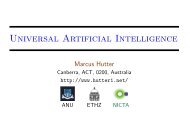A Framework for Evaluating Early-Stage Human - of Marcus Hutter
A Framework for Evaluating Early-Stage Human - of Marcus Hutter
A Framework for Evaluating Early-Stage Human - of Marcus Hutter
You also want an ePaper? Increase the reach of your titles
YUMPU automatically turns print PDFs into web optimized ePapers that Google loves.
and, as a result, it will relieve its fatigue at the expense<br />
<strong>of</strong> increasing its hunger level by 2. Per<strong>for</strong>ming an instantiated<br />
sleep action will af<strong>for</strong>d ME a net increase <strong>of</strong><br />
(∗ 2 ?f) in its cumulative utility.<br />
Instantiating an operator requires replacing its <strong>for</strong>mal<br />
parameters with actual values through unifying<br />
the preconditions with facts in ME’s current knowledge<br />
base, and such an instantiated action is considered applicable<br />
in the current state. At all times, ME maintains<br />
a plan comprised <strong>of</strong> a sequence <strong>of</strong> instantiated actions.<br />
Planning is accomplished by <strong>for</strong>ward search from<br />
a given state, followed by propagating backward the anticipated<br />
rewards and costs <strong>of</strong> the various actions and<br />
states reached, to obtain a seemingly best sequence <strong>of</strong><br />
actions. The <strong>for</strong>ward search is constrained by a search<br />
beam, which specifies the allowable number <strong>of</strong> branches<br />
and the allowable operators <strong>for</strong> each search depth. In<strong>for</strong>med<br />
by this projective <strong>for</strong>ward search, ME will then<br />
execute the first action <strong>of</strong> the seemingly best plan, and<br />
update its knowledge accordingly (in effect, observing<br />
non-occluded facts, including ones that have become<br />
false, in its local environment).<br />
The simulated world is a dynamic one in which exogenous<br />
events such as fire and rain can spontaneously<br />
begin and end with some probability at each time step;<br />
there<strong>for</strong>e, unexpected changes can arise in the <strong>for</strong>m <strong>of</strong><br />
unexpected action failures, unexpected threats, and unexpected<br />
serendipitous opportunities. For example, a<br />
fire may start and disrupt ME’s travel, or ME may<br />
scratch a lottery coupon and find that it has won one<br />
million dollars. Since the world is only partially known<br />
and partially predictable from ME’s perspective, and<br />
since actions (such as traveling) can take multiple time<br />
steps, with the possibility <strong>of</strong> interference by exogenous<br />
events, we need to model “actual” actions in ME’s<br />
world separately from ME’s (STRIPS-like) conception<br />
<strong>of</strong> those actions.<br />
The following is the stepwise version sleep.actual <strong>of</strong><br />
the sleep operator:<br />
(setq sleep.actual<br />
(make-op.actual :name ’sleep.actual<br />
:pars ’(?f ?h)<br />
:startconds ’((is_at ME home)<br />
(is_tired_to_degree ME ?t)<br />
(>= ?f 0.5)<br />
(is_hungry_to_degree ME ?h)<br />
(> ?f ?h))<br />
:stopconds ’((there_is_a_fire)<br />
(is_tired_to_degree ME 0))<br />
:deletes ’((is_tired_to_degree ME ?#1)<br />
(is_hungry_to_degree ME ?#2))<br />
:adds ’((is_tired_to_degree ME<br />
(- ?f (* 0.5<br />
(elapsed_time?))))<br />
(is_hungry_to_degree ME<br />
(+ ?h (* 0.5<br />
(elapsed_time?)))))))<br />
The start conditions as given by startconds are the<br />
same except <strong>for</strong> removal <strong>of</strong> the (there is a fire) <strong>for</strong>mula.<br />
Notably, the actual action will continue <strong>for</strong> an-<br />
111<br />
other time step if and only if neither <strong>of</strong> its stop conditions<br />
as given by stopconds is true in the current state.<br />
If at least one <strong>of</strong> them is true in the current state, then<br />
the action will immediately terminate. Otherwise, the<br />
current state and ME’s knowledge base will be updated<br />
with ME’s lower fatigue level and higher hunger level.<br />
ME currently has various operators at its disposal,<br />
enabling it to answer the user’s yes/no questions and<br />
wh- questions, to walk, sleep, eat, drink, ask other<br />
agents whether something is true, play, read, withdraw<br />
money from a bank, buy something from a store, and<br />
work and save money. Moreover, via operator (listen!),<br />
the user can signal to ME that a question or assertion<br />
(in symbolic <strong>for</strong>m, not in English at this point) is about<br />
to be sent, and ME will ”hear” and save that assertion<br />
or question, and potentially respond. Since answering<br />
questions has been assigned a high utility, ME will prefer<br />
to answer questions and verbalize its responses (as<br />
English sentences printed on the screen). Alternatively,<br />
<strong>for</strong> diagnostic reasons, the user is also provided with the<br />
ability to peer into ME’s knowledge base and obtain<br />
the answer to a question immediately, without having<br />
to ask ME a question.<br />
Preliminary Results<br />
To empirically demonstrate the benefits <strong>of</strong> explicit selfawareness<br />
and <strong>of</strong> opportunistic (but still thoughtful)<br />
behavior in a self-motivated agent, we have created scenarios<br />
allowing some initial ablation tests. Here we describe<br />
some as yet incomplete attempts to investigate<br />
ME’s per<strong>for</strong>mance (in terms <strong>of</strong> cumulative utility) with<br />
and without self-knowledge, and with and without opportunistic<br />
tendencies.<br />
In all scenarios, there are four locations home,<br />
grove1, plaza1, and company1, with road path1 <strong>of</strong><br />
length 2 connecting home and grove1, path2 <strong>of</strong> length<br />
3 connecting home and plaza1, and path3 <strong>of</strong> length<br />
2 connecting grove1 and company1 in the simulated<br />
world. Agent ME’s knowledge base is initialized to reflect<br />
that it is at home, is not tired, has a thirst level <strong>of</strong><br />
4, has a hunger level <strong>of</strong> 2, and knows that applejuice1<br />
is potable and at home. Object pizza1 is edible and<br />
at plaza1. Object applejuice1 is potable and at home.<br />
Agent guru knows whether applejuice1 is potable and<br />
whether pizza1 is edible.<br />
In addition, ME has a variety <strong>of</strong> operators at its disposal,<br />
enabling it to answer the user’s yes/no questions<br />
and wh-questions, walk, sleep, eat, drink, ask other<br />
agents whether something is true, play, read, buy something<br />
from a store, and work and save money. Also<br />
there are two types <strong>of</strong> exogenous events, namely fire<br />
and rain. Provided there is no rain, a spontaneous fire<br />
has a 5% chance <strong>of</strong> starting; once it has started, it has<br />
a 50% chance <strong>of</strong> stopping, and it also goes out as soon<br />
as there is rain. Spontaneous rain has a 33% chance<br />
<strong>of</strong> starting; once it has started, it has a 25% chance <strong>of</strong><br />
stopping.<br />
In normal operation, ME will gain rewards from<br />
the actions it per<strong>for</strong>ms (e.g., roaming, eating, or an-


